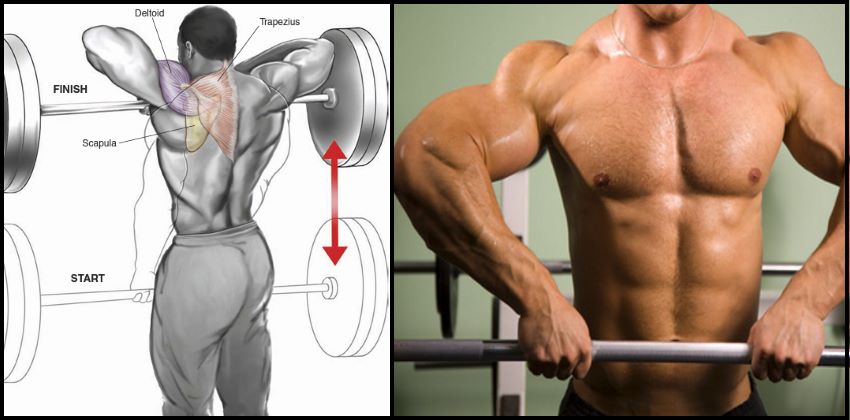When it comes to building cannonball deltoids, you can see the same shoulder exercises being performed in almost every gym you enter. Barbell and dumbbell presses, lateral raises, front raises, rear delt raises… The one exercise you can’t see very often, at least when it comes to shoulder training, is the barbell upright row.
Upright row benefits and Dangers
The barbell upright row is one of the best trapezius and shoulders exercises. When done right, it can build mass and strength in your side delts, front delts and traps. However, it can also be potentially dangerous for the shoulders and cause an injury if it’s not done using proper form.
The ones that are performing the upright row are usually performing the exercise with a narrow grip, lifting the elbows higher than the shoulders which makes it a great trapezius exercise rather than a shoulder exercise.
At the same time lifting the barbell up to the neck and elbows way higher than the shoulders, puts your elbow joint in “internal rotation”. The head of the upper arm bone closes the distance between surrounding bones and all the bones can start rubbing against the rotator cuff. This leads to shoulder pain and injury, especially if you lift heavy weights.
The upright row, however, can become a safe exercise that works all three portions of your deltoids (front, middle, and rear) and become more effective with a few minor modifications.
How to perform the barbell upright row

1. Stand with your feet slightly less than shoulder width apart. Grab a straight bar with an overhand grip, with your hands positioned slightly wider than your shoulder width. Rest the bar on your thighs.
2. Standing straight and using only deltoid force, pull the bar up toward your chin, keeping it close to your body.Bring your elbows up to the point where the bar reaches lower to mid-chest level.
3. Your elbows should remain flared outward during the movement. When the bar reaches middle chest level, pause for a second and squeeze your shoulders and trapezius.
4. Lower the bar in the starting position, and repeat the whole movement again.
If you are not yet familiar with the barbell upright row, start with an empty barbell. This will give you a chance to learn correct movement, correct posture and feel the muscles you are working. You can start adding weight gradually as you become stronger and more experienced, although it’s never a good idea to lift heavy weights on this exercise.
Common errors while performing upright rows :
1. Very narrow grip – this will activate the trapezius more than the deltoids. It also can lead to impingement at the shoulder joint. Keep your hands positioned at shoulder width or slightly wider.
2. Very wide grip – Your traps should also assist in the movement and too wide grip will prevent your trapezius from assisting in the movement.
3. Leaning back too far – A common mistake many novice lifters make is leaning back as you pull the bar up.This can can hurt your lower back.
4. Using too much weight – No need for a comment here, too much weight can hurt your form and your shoulders.
5. Jerking the weight or pulling too fast – not only it will break your form and prevent you from recruiting more muscle to do the movement, but it can also cause an injury to your lower back and rotator cuffs.
Barbell upright row variations
A barbell loaded with lighter weight plates is a great tool to learn proper execution of upright rows. Two great variations of the barbell upright row you can do are smith machine rows and dumbbell upright rows.
